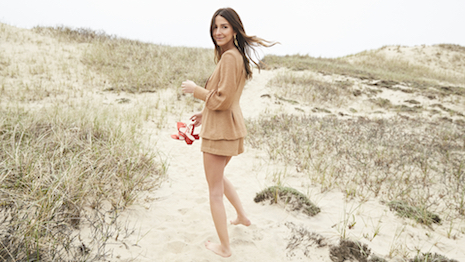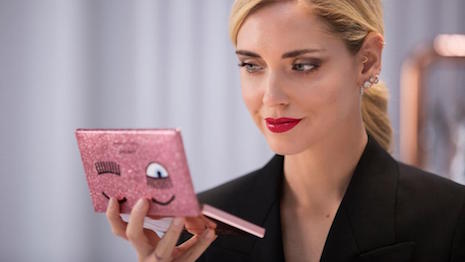 Arielle Charnas has developed a line with Nordstrom. Image courtesy of Nordstrom
Arielle Charnas has developed a line with Nordstrom. Image courtesy of Nordstrom
As the influencer marketing business grows, personalities are rolling their significant followings into entrepreneurial ventures. But as influencers move from brand collaborator to competitor, what does it mean for luxury brands? Celebrity-level influencers such as Chiara Ferragni and Jeffree Star have launched brands based on their public personas, tapping into their existing audiences to sell fashion or beauty products. According to a new report from Fashionbi, some of these brands have taken off and have drawn an even larger audience than the individuals themselves, pointing to the potential impact of these influencer-led labels. "Such expansion of the fashion influencers, who used to be advertising channels for the companies, into the brands, means additional competition on the market," said Yana Bushmeleva, chief operating officer at Fashionbi, Milan. "With the top influencers, the brands can do collaborations on the collections, for example the past collaboration between the Chiara Ferragni brand and Converse. "The companies can also focus on special events and engage such influencers as the guests or hosts," she said. "Nonetheless, the KOLs can still act as ambassadors, important not to miscalculate the target audience." Selling influence The influencer market has climbed from $500 million in 2015 to $4.6 billion in 2018. Influencer marketing is expected to rise to $6.5 billion this year. Instagram is the leading platform for influencers, with 78 percent of these personalities turning to the image- and video-heavy network. The influencer market on Instagram is $1.7 billion in 2019, and it is expected to reach $2.3 billion by 2020. As social media personalities gain influence, they are expanding their personal branding into products.
Instagram post from Alexa Chung's fashion brand Some labels and product partnerships have been produced in conjunction with luxury retailers or brands. For instance, Something Navy’s Arielle Charnas inked a deal with Nordstrom in 2018 to create an exclusive line of clothing and accessories. "With Something Navy, we are able to give our customers an exclusive new brand based on Arielle's unique aesthetic,” said Jennifer Jackson Brown, president of Nordstrom Product Group, in a statement at the time of the partnership launch. “The brand will expand into additional categories each season, reinforcing our commitment to introduce exciting new product regularly.” The retailer's president Pete Nordstrom has called the Something Navy launches its most successful brand debuts, according to WWD. Similarly, in addition to her own label, Ms. Ferragni recently launched a co-branded beauty partnership with Lancôme. Marking her first beauty line, the collection of eye shadow, lipstick, mascara and more retailed exclusively at Nordstrom (see story).
 Chiari Ferragni designs new palette for Lancôme. Image credit: Lancôme
However, having a huge personal following does not guarantee that that audience will automatically engage with a brand. Emily Ratajkowski has 24 million followers, yet her Inamorata brand of apparel and swimwear counts only 477,000 followers.
While Ms. Ratajkowski’s ratio of brand to personal followers is below the average of 10 to 14 percent, it is typical for an influencer’s brand to attract a smaller audience. This leaves room for growth among these brands.
An outlier, Huda Kattan has 1.4 million followers, but her Huda Beauty brand has a larger reach with an audience of 38.8 million.
Even if they have separate accounts, influencers typically promote their own lines on their personal channels.
Since many influencer entrepreneurs know others with similar audiences, sometimes they themselves run influencer marketing efforts around their products.
For instance, Camila Coehlo tapped her friends Aimee Song, Negin Mirsalehi and Chriselle Lim to help promote her line with Revolve.
Besides competing with luxury brands for customers, some influencer entrepreneurs have been called out by watchdog Diet Prada for copying designer goods from brands including Prada, Alaïa and Valentino.
Chiari Ferragni designs new palette for Lancôme. Image credit: Lancôme
However, having a huge personal following does not guarantee that that audience will automatically engage with a brand. Emily Ratajkowski has 24 million followers, yet her Inamorata brand of apparel and swimwear counts only 477,000 followers.
While Ms. Ratajkowski’s ratio of brand to personal followers is below the average of 10 to 14 percent, it is typical for an influencer’s brand to attract a smaller audience. This leaves room for growth among these brands.
An outlier, Huda Kattan has 1.4 million followers, but her Huda Beauty brand has a larger reach with an audience of 38.8 million.
Even if they have separate accounts, influencers typically promote their own lines on their personal channels.
Since many influencer entrepreneurs know others with similar audiences, sometimes they themselves run influencer marketing efforts around their products.
For instance, Camila Coehlo tapped her friends Aimee Song, Negin Mirsalehi and Chriselle Lim to help promote her line with Revolve.
Besides competing with luxury brands for customers, some influencer entrepreneurs have been called out by watchdog Diet Prada for copying designer goods from brands including Prada, Alaïa and Valentino.
Instagram post from Diet Prada Influencer economy Fashion influencer and entrepreneur Olivia Palermo relaunched her Web site this week to let readers shop editorial content and buy items directly from the article itself. Visitors to OliviaPalermo.com will be able to click on links and purchase products such as bags, scarves, belts, footwear, hair-pieces and hats. They can also buy items directly from The Boutique section of the site that includes selections from 25 brands with whom Ms. Palermo has longstanding relationships (see story). As influencers get into direct selling, their credibility among consumers may help them generate business. Research shows that more than half of social media users find user-generated content to be more trustworthy and authentic than brand images. According to a report from Olapic, 44 percent of social media users follow influencers, including the majority of U.S. respondents. More than half of users have directly mentioned or tagged brands on social media (see story). While an influencer's business is intrinsically tied to the individual, Fashionbi notes the benefit of separating the product from the personal. "It doesn't matter if it's a personal new brand or a well-established company, the position on the market is defined by unique product proposition and the up to day marketing activities," Ms. Bushmeleva said. "For example, Huda Beauty as a beauty brand is much stronger than the popularity of Huda herself," she said. "At the same time, the Inamorata brand has much lower awareness than Emily Ratajkowski. "For the long-term perspective, the KOL should develop the brand as a stand-alone business. Otherwise, any negative news around the KOL or any influence of the external factors – for example the closure of the Instagram, which is the main platform for KOLs – can lead to the termination of the business."
